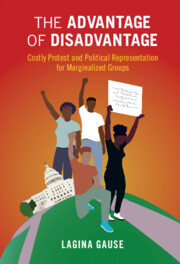Crossref Citations
This Book has been
cited by the following publications. This list is generated based on data provided by Crossref.
Gause, LaGina
2022.
Costly Protest and Minority Representation in the United States.
PS: Political Science & Politics,
Vol. 55,
Issue. 2,
p.
279.
Oser, Jennifer
2022.
Prisms of the People: Power and Organizing in Twenty-First-Century America By Hahrie Han, Elizabeth McKenna and Michelle Oyakawa. Chicago Studies in American Politics Chicago: Chicago University Press, 2021. 216 pp., $27.50 Paperback.
The Journal of Race, Ethnicity, and Politics,
Vol. 7,
Issue. 3,
p.
604.
Yadon, Nicole
2022.
“They Say We’re Violent”: The Multidimensionality of Race in Perceptions of Police Brutality and BLM.
Perspectives on Politics,
Vol. 20,
Issue. 4,
p.
1209.
Wouters, Ruud
Staes, Luna
and
Van Aelst, Peter
2023.
Word on the street: politicians, mediatized street protest, and responsiveness on social media.
Information, Communication & Society,
Vol. 26,
Issue. 16,
p.
3103.
Krause, Werner
and
Matsunaga, Miku
2023.
Does Right-Wing Violence Affect Public Support for Radical Right Parties? Evidence from Germany.
Comparative Political Studies,
Vol. 56,
Issue. 14,
p.
2269.
Carpenter, Daniel
2023.
Agenda Democracy.
Annual Review of Political Science,
Vol. 26,
Issue. 1,
p.
193.
Peay, Periloux C.
2024.
The People’s Intervention: How #BlackLivesMatter Circumvented a Culture of Congruent Criminal Justice Policies in American States.
The Journal of Race, Ethnicity, and Politics,
Vol. 9,
Issue. 1,
p.
123.
Hoang, Bai Linh
and
Benjamin, Andrea
2024.
“Defund” or “Refund” the Police?: City Council Responsiveness to the Black Lives Matter Protests.
Urban Affairs Review,
Vol. 60,
Issue. 1,
p.
387.
Manekin, Devorah
Mitts, Tamar
and
Zeira, Yael
2024.
The politics of allyship: Multiethnic coalitions and mass attitudes toward protest.
Proceedings of the National Academy of Sciences,
Vol. 121,
Issue. 19,
Mclaren, Leann
and
Walker, Zoe
2024.
By Any Means Necessary? How Black and White Americans Evaluate Protest Tactics in Response to a Police Killing.
The Journal of Race, Ethnicity, and Politics,
Vol. 9,
Issue. 2,
p.
235.
Collins, Jonathan E.
2024.
They only hate the term: policy branding and the politics of critical race theory.
Journal of Public Policy,
Vol. 44,
Issue. 4,
p.
826.
Gause, LaGina
and
Lorenz, Geoffrey M.
2024.
Lobbying venue selection under separation of powers and resource constraints.
Interest Groups & Advocacy,
Vol. 13,
Issue. 2,
p.
73.
Cornejo, Monica
and
Kam, Jennifer A.
2024.
Advancing advocacy communication theory: a theory grounded in undocumented college students’ motivations and strategies for challenging oppression.
Annals of the International Communication Association,
Vol. 48,
Issue. 3,
p.
237.
Puente Martínez, Khmevirg
2024.
Origen y desarrollo de los estudios legislativos: temas, escuelas y tendencias.
Revista Mexicana de Ciencias Políticas y Sociales,
Vol. 69,
Issue. 252,
2024.
Race and Inequality in American Politics.
p.
216.
2024.
Race and Inequality in American Politics.
p.
169.
Simonson, Matthew David
Block Jr, Ray
Druckman, James N.
Ognyanova, Katherine
and
Lazer, David M. J.
2024.
Black Networks Matter.
Pereira, Miguel M.
Giger, Nathalie
Perez, Maria D.
and
Axelsson, Kaya
2025.
Encouraging politicians to act on climate: A field experiment with local officials in six countries.
American Journal of Political Science,
Vol. 69,
Issue. 1,
p.
148.



